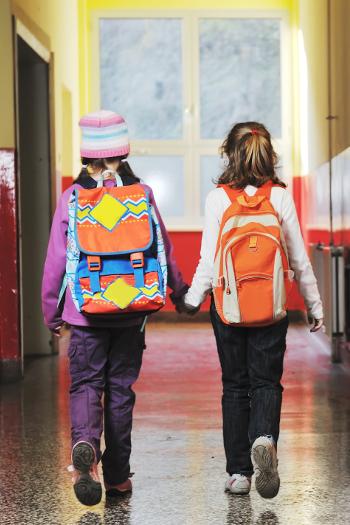First day of kindy, childcare or school
Duration/age

The first day of starting anything new can be a very stressful time your child. As the big day approaches, talk about what might happen, who will be there and what they can do if a problem occurs. Creating routines and having a dry run can help to reduce anxiety as your child will begin to understand what to expect.
Sometimes it can help to visit the kindy or school together before starting. Visiting together allows you to show your child where the toilets are, where they go to get a drink, where they are allowed to play, who their teacher is and where to place their bag. Taking photos of the important places and people will help you to talk to your child about what to expect before they start.
This might even be the first time that your child is left with people who are not family or friends of the family. Or it might be a transition from one place to another. Talk to your child before they start about the different rules or routines they may experience.
Will you need to wear your hat when you go outside? Do you need to ask the teacher if you want to go the toilet?
Talk about when and where they will eat the food they have brought and what the routine will be when they first arrive.
Packing the bag and getting the school uniform or kindy clothes ready the night before can also help to make the morning calmer
Materials you will need
- Bag
- Camera
- Clothing
Skills this activity improves
Why does this matter?
Talking to your child about what will happen when they start at kindy or school will help your child to make predictions about what their day will look like and will help them to identify regular routines and to understand the order and sequence that events will occur in.
By talking about what will happen at the kindy or school you are helping your child to develop language about time, routines and events and to ask questions. Asking questions helps a child to solve problems and helps them to understand what is happening around them.
What does this lead to?
Planning and talking with your child about what will happen on their first day is important as children do not understand time in the same way as adults. Setting up home routines and identifying the predictable routines of the kindy or school will reduce your child’s anxiety as they will have an idea of what will happen and the order that it will happen.
Exploring what may happen will help your child to solve problems that may occur when they are on their own and to will help them to organise their belongings. When children are able to act independently and understand what will happen they feel calmer and are more ready to engage in learning.
Language to use
- Morning, afternoon, home time, recess, lunch, playtime, rest time
- Playground, inside, outside, mat time, library, classroom, toilet
- Bag, lunch box, drink, snack, hat
- Uniform
- Bell
- Teacher
Questions to use
- What do you need to take with you every day?
- Where does your bag go?
- What do you need to do first?
- What do you need to put on first?
- What do you need to bring home?
Useful tips
- For more information on starting school or kindy refer to www.parenting.sa.gov.au
- You might also want to look at the activities Packing the lunch box and Packing your bag.
- Remember to talk to the teacher if you have any concerns.
- Remember to talk to your child in your home language.
More ideas
- Create a story book about starting kindy or school.
- Borrow books from the local library about first days.
- Send an email or letter to family members with photos about the first day.
- Mark on a calendar when the big day will be and count off as you go.
Variation by age
Three to five year olds
- Make a picture routine of what needs to happen each morning.
- Your child could create their own cover and labels for books and belongings.
- If you need to buy new clothing or resources for the first day get your child to be a part of it.
- Make a list of lunch box ideas together.
- Cook healthy treats and food for the lunch box together.
- Create or cook together some special treats for when your child gets home, such as fruit iceblocks, fruit kebabs or funny face pizzas.
- Set up an afternoon play date or tea party with your child. This is an opportunity to share what has happened during the day.
Questions to ask
- What would you like to eat at kindy?
- What can we pack into the bag?
- What do you need to do this morning to get ready?
- Where does your lunch box need to go?
Language to use
- Night-time, morning, end of day, lunchtime
- Lunch, snack, drink
- Cold food, hot food


